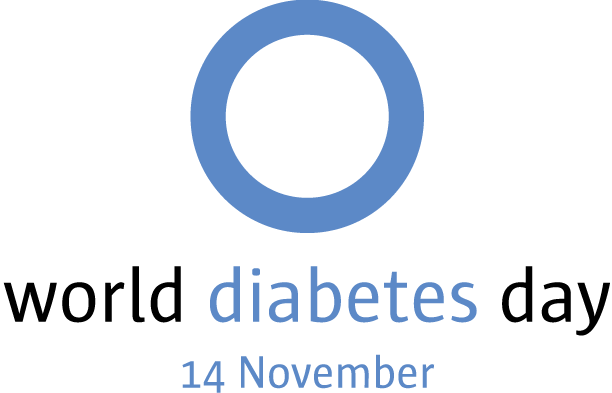November 14, every year is World Diabetes Day and the month of November is also dedicated to creating awareness about it. As part of their contributions towards public education about diabetes, Nigeria Health Online, NHO, in conjunction with Roche Pharmaceutical Nigeria Limited, organised a Media Round Table on the Burden of Diabetes in Nigeria. Assistant Editor, CHINWE MADUAGWU reports.
November 14, every year is marked as World Diabetes Day (WDD). The day, which is dedicated to creating awareness on the disease is on the theme: “The Family and Diabetes.”
In addition to November 14 being World Diabetes Day, the month of November is equally dedicated to raising awareness on diabetes.
According to the International Diabetes Federation, IDF, diabetes concerns every family and because of the magnitude of the problems associated with the disease, the Federation said it has adopted a two-year timeframe “to best align the World Diabetes Day campaign to its current strategic plan.”
The Federation, also, for the next two years will develop materials and actions aimed at raising awareness on the impact of diabetes on the family and support network of those affected and promoting the role of the family in the management, care, prevention and education of diabetes.
Back home here, as part of its contribution to raising awareness on diabetes, Nigeria Health Online, NHO, a publication of Healtheways Communications Nigeria Limited in conjunction with Roche Pharmaceutical Nigeria Limited, organised a Media Round Table on the Burden of Diabetes in Nigeria.
At the event chaired by Mrs. Funke Egbemode, President, Nigerian Guild of Editors, NGE, were health editors writers of various media, some senior staff of Roche as well as some endocrinologists.
In her welcome remarks, Egbemode who was represented by the Secretary of the Guild, Ms. Victoria Ibanga, noted that the statistics on the burden of diabetes in Nigeria was “staggering and alarming.”
She said: “It’s sad to learn that about 3.9 million people are currently living with diabetes in Nigeria, while about 846, 000 cases remain undiagnosed. These figures are staggering and at the same time alarming. In no small measure, it’s a call to duty, a call to collective responsibility and a call to action. It’s our duty to take action and the time to do that is now!
She commended the organisers of the event whom she said were on the right path of advocacy, adding that “this gathering is not only topical, it is very important and critical. It is critical in the sense that it would afford Nigerian governments both at Federal and state levels to mount different stages or podiums to look us in the eyes and tell us how much has been achieved in the last one year or long years since the declaration of the day in 1991. We all know the reasons UN and other world bodies make declarations. It’s usually to look for all available ways to cut down incidents of diseases or bring an issue to the front burner.
“Every serious journalist should be interested in efforts aimed at mitigating the spread of the disease, which is fast spreading, like cancer, which, therefore, brings us to the role of the media.
“The media has a major role to play in creating awareness about the disease and shaping of public opinion. As the fourth Estate of the Realm, it is the responsibility of the media to call governments to account and provide good leadership to the benefit of the populace. It is also our responsibility and business to speak truth to authorities especially areas like health, which they have failed woefully.”
Mrs. Egbemode noted that it was the responsibility of the media to ask questions about the budget for the health sector, how much is allocated, how much is implemented and how it benefits the low and middle income communities.
She also pointed out that it was the duty of the media to spread their tentacles to the rural communities and provide them information and options especially ways to detect symptoms of diseases such as diabetes.
Speaking on ‘Diabetes and the Family,’ Dr. Afokoghene Isiavwe, a Consultant Endocrinologist/Diabetologist, explained that “diabetes occurs when there are raised levels of glucose in the blood because the body cannot produce any or enough of the hormone insulin or use insulin effectively.”
According to her, four out of five people with diabetes live in low- and middle- income countries.”
On the prevalence of the disease around the world, the Consultant disclosed that 98 million people between the age of 65-79 and 327 million people between the age of 20-64 were diagnosed with diabetes in 2017, adding that 212 million people with diabetes remain undiagnosed.
Furthermore, she noted that it has been projected that by 2045 that 191million people between the ages of 65-67 and 438 million people between the ages of 20-64 will have diabetes.
Lamenting the lack of a national statistics, Dr. Isiavwe disclosed that the last nationwide health (diabetes) survey in Nigeria was in 1992, “when a diabetes mellitus (DM) prevalence of 2.2% was reported,” but said a pooled prevalence of 5.77% was recorded in 2018.
She, therefore, called for a National Diabetes Registry. The Diabetologist explained that the main focus of the campaign for this year is; Discover diabetes, Prevent diabetes and Manage diabetes.
On how to discover diabetes, she advocated screening and knowing the symptoms and signs of the disease. Disclosing that one in every two people with diabetes is undiagnosed, she stressed “knowing the signs and symptoms can lead to early diagnosis while early diagnosis and treatment were key to helping prevent or delay life-threatening complications. Detecting diabetes early involves the family too.”
On the complications of diabetes, she said: “Retinopathy affects over one-third of all people with diabetes and is the leading cause of vision loss in working-age adults; People with diabetes are 2-3 times more likely to have Cardiovascular disease (CVD); The prevalence of end-stage renal failure (ESRF) is up to 10 times higher in people with diabetes; Every 30 seconds a lower limb or part of a lower limb is lost to amputation.”
The Doctor advised that pregnant women with diabetes or at risk of gestational diabetes should manage their glycaemia throughout their pregnancy to avoid long term consequences for themselves and their children and transgenerational effect (higher risk of obesity, diabetes, hypertension and kidney disease in their offspring).
Stressing the need for the involvement of the entire family in the prevention of diabetes especially Type 2, she said people should adopt a healthy lifestyle, eat healthy meals and exercise together as that is beneficial and encourages behaviours that could help prevent type 2 diabetes in the family.
She further called on those with a family history of diabetes to learn about diabetes, its risks, symptoms and complications and how to prevent them, stressing the importance of living in an environment that supports healthy lifestyles and helps them to prevent type 2 diabetes. She added: “reducing your family’s risk starts at home.”
For people already living with diabetes, Dr. Isiavwe said management of the disease requires daily treatment, regular monitoring, healthy lifestyle and on-going education.
READ ALSO: BREAKING: 21,000 Men to Undergo Simultaneous Surgery to Mark World Vasectomy Day
Again she stressed: “Family support is key.”
On how to manage diabetes beyond the family level, she said all health professionals should have the knowledge and skills to help individuals and families manage diabetes and should know when to refer to the Endocrinologist/diabetes specialist.
“Diabetes Education and ongoing support should be accessible to all individuals and families to help manage diabetes.
“Persons living with diabetes will be found at every clinic; general practice, ante-natal, eye clinic, dentist, surgery, ENT etc…..it is important the appropriate care is given.
“Diabetes affects the old, young, rich, and poor. Therefore, essential diabetes medicines and care must be accessible and affordable for every family,” she said.
Dr. Isiavwe further advocated that HMOs and Health Insurance companies should reimburse diabetes education adding that an informed and enlightened person living with diabetes was less likely to have problems in diabetes management and less likely to develop complications.
In her presentation titled: ‘Structured Testing of Blood Glucose in the Management of Diabetes,” Mrs. Susan Snell, Head of Roche Diabetes Care: Sub-Sahara Africa, highlighted the importance of structured testing of blood glucose as a necessary measure a patient must take to achieve control of the disease.
She disclosed that Roche has been involved in diabetes patient care for 30 years by providing the Accu-check blood sugar measurement which they could use at home or anywhere they are.
Snell described the Accu-Chek device as a “tailor-made diabetes self management solution” designed to help people with diabetes to manage their condition and also enhance their quality of life.
She said the company has taken measures to protect the device against fake and poor quality products brought into the country through parallel importation by introducing the authentication label to enable users confirm the authenticity of their strips through toll free SMS.
Furthermore, she disclosed that Roche will be introducing new devices in 2019 to further assist Nigerians living with diabetes and also help in early detection of new cases in the country, considering data showing that worldwide, one-third of people with diabetes don’t know they have it.
Mrs. Snell noted that in Nigeria, the prevalence of the disease varies from region to region and is increasing. According to her, the South-South has the highest prevalence of diabetes, about 10% in the country.
“Not only is there prevalence, but it is increasing faster than in some of the other continents, so for sure the burden is there. For me though, the good news is that a lot of it can be prevented, but even if it can’t be prevented it can be successfully managed and I truly believe if we work together with health care professionals, with government, with ourselves as industries that we can help people live well with diabetes,” she said.
On the reasons for the rise in prevalence, she said: “Everything boils down to life style, people moving from rural to urbanised areas, eating differently, we are sitting behind desks all day, using our computers, we have our phones at our finger tips you know previously we would just walk to a library to find something but we can do that with our telephones now, people living sedentary lives. I think these are some of the major things contributing to the growth.
“Then, of course, the lack of awareness, I think that might be the difference between why in Africa it is growing so fast, we still don’t diagnose quick enough, patients are not yet aware of the dangers of diabetes and so we are not looking after ourselves enough to check it regular.”
To check the growth rate of the disease, Mrs. Snell said: “For anyone who has diabetes in the family, from the age of 30 onwards once a year you go and just get checked. Generally, they are saying if you don’t have diabetes in your family you can wait until you are 40 and above and then, of course, if you experience any symptoms. We heard from a patient today, sometimes with the symptoms you just think you’re tired or you over-worked or you’re stressed or whatever. It’s hard to say if you experience blurry vision or you’re frequently urinating that will stop you in your tracks and make you think of diabetes. I would encourage everyone especially in this month of November, which is diabetes month, to go in and get checked. It’s quick and easy,” she advised.
The Marketing Manager West Africa (Diabetes Care), Roche, Mr. Adeniyi Adebayo, explained that Roche was particular about diabetes because it realises that it has become an epidemic.
“IDF statistics show the prevalence of diabetes and what we found out is that in this part of the world it is continually growing and we need to bring this awareness to everyone. On our part, we are trying to educate the public and also the doctors and pharmacists on how to manage diabetes. You know this is a condition that has no cure, it stays with the patients for as long as they live and if you consider the face time a person has with a doctor, it’s just about 1% of their lifetime most of the time they’re on their own. The patients themselves must need adequate information on how to make sure their blood sugar is in range, they don’t fall into complications and they don’t need to be admitted, so that’s where we are channelling all our resources to bring this education to the public,” he said.
He explained further that one of the ways Roche is supporting public education about diabetes is by supporting Diabetes Association of Nigeria across the 36 states in their programmes for this year’s World Diabetes Day.











